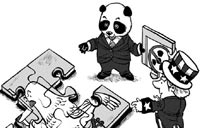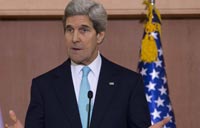

US Secretary of State John Kerry will find himself more than welcome in Beijing if he is here to convey Washington's commitment to a positive relationship, as the US Department of State put it.
|
 |
| John Kerry's moment in Asia |
|
 |
| Kerry's visit bodes well for China-US ties |
Beijing and Washington need to compare notes on their rhetoric about a "new type of major-country relationship", and explore ways to navigate the so-called "Thucydides' trap". For the well-being of both countries and the world at large, their relationship has to be positive.
He will also be welcome if he has feasible suggestions "for reducing the regional acrimony over competing claims in the East and South China seas". Beijing, too, is concerned about the hazardous potentials of such flashpoints and seeks crisis prevention.
But before asking Beijing to clarify its intentions, Kerry should sort out for his hosts those of Washington's. While his role on this specific trip looks like that of a firefighter, his latest remarks, however, sounded the very opposite. His vow of protection for Japan in an anticipated conflict between Japan and China in the East China Sea, for instance, was nothing short of the United States' seal of approval for Shinzo Abe's brinksmanship.
Unless he can convincingly persuade his hosts that this is not the US' true thinking regarding the region's current impasse, Kerry should not expect a substantial outcome.
Washington's approach to the sovereignty disputes has been characterized by a faulty premise and a wrong conclusion.
From the very beginning, Washington's narrative has put China the role of the bad guy, labeling it as a bully, or a "destabilizing" character, in the neighborhood.
In both the East and South China seas, Beijing has been in a defensive role, responding passively to foreign provocations. Blinding itself to this essential truth, and encouraging the perpetrators, Washington has instead accused Beijing, the real victim, of escalating tensions.
While nobody expects Washington to play the impartial mediator, that does not mean it has the license to add fuel to the fire.
The deadlocks in the East and South China seas have no solutions unless Washington moves to rein in Japan and the Philippines and stops them from pushing the envelope too far. What it has said and done to date, however, indicates the contrary.
The only chance for Kerry to make his hosts in Beijing commit to any new initiative in conflict resolution is to assure them of a serious US commitment to the same.